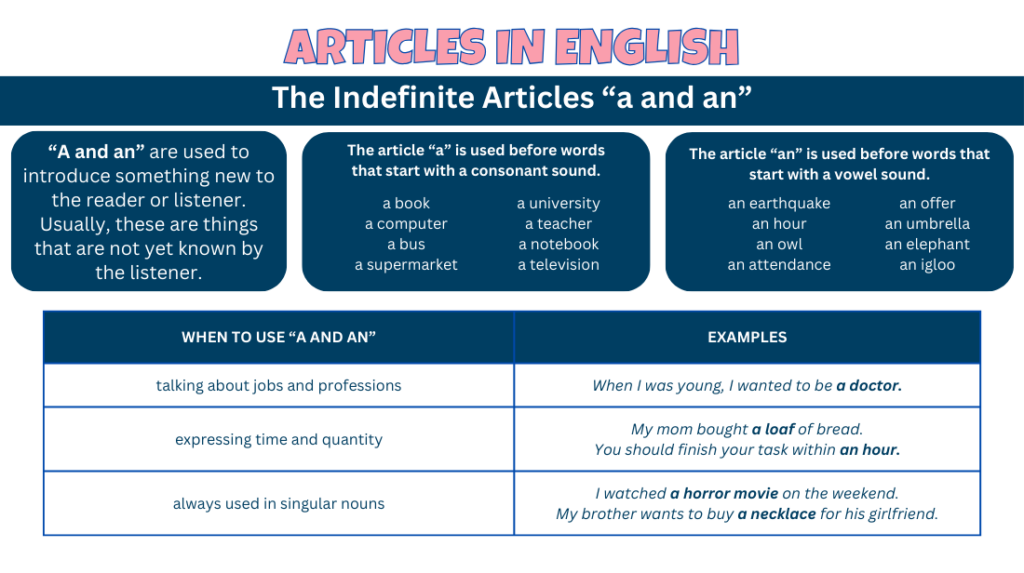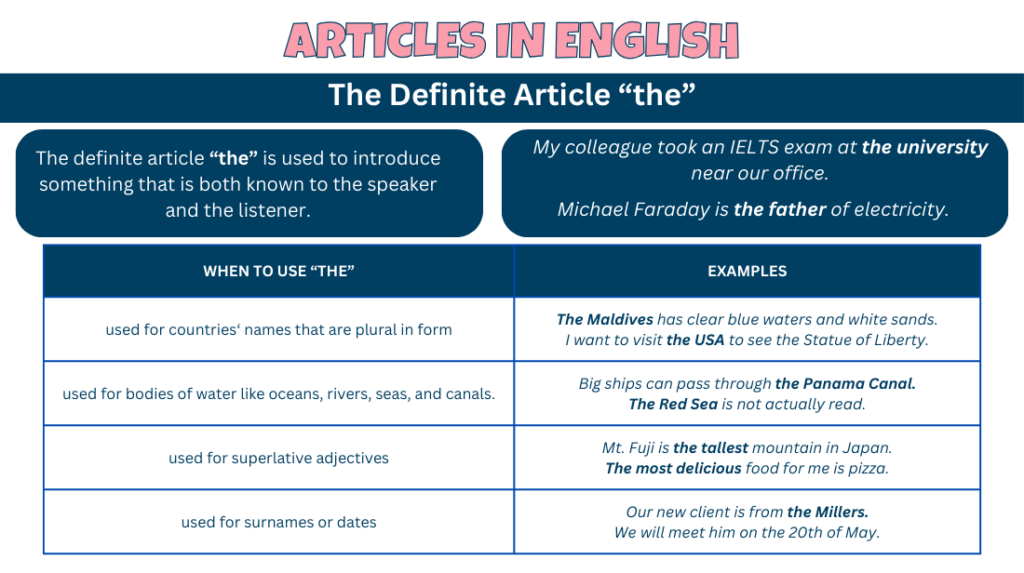
21 Essential Rules for Using Articles in English (No More Confusion!)
Have you ever noticed that in most sentences in English, you always see the words “a, an, and the”? Have you ever wondered why these are common in sentences? These are articles in English and they are one of the most important parts of grammar.
Articles in English – a, an, and the – are tiny features in the English language that might seem insignificant at first glance, but they play a very crucial role in language learning. Understanding the basic essential rules for using articles in English is vital to achieving meaningful and effective communication.
The articles in English
Articles in English are an essential part of learning English grammar. Their role is to introduce a word in sentences or function as a specific determiner of some parts of speech like nouns, adjectives, and adverbs.
“A, an, and the” can make your English clear and precise. It is sometimes confusing for language learners to use these articles in English because although they are familiar with them, they are unaware of the correct usage in sentences.
The two types of articles in English are the definite article and the indefinite article.
- Definite Articles: the
- Indefinite Articles: a and an
Each of these types of articles has its functions and usage. Observe the correct rules for using them in sentences. The pronunciation of these articles in English is more applicable to speaking than to writing.
The article “the” has two pronunciations: /ði:/ and /ðə/. The article the /ðə/ is used before a word that starts with a consonant sound, whilst the article the /ði:/ is used before a word that starts with a vowel sound. For example, we say “the” /ði:/ apple or “the” /ðə/ ball.
The indefinite articles “a and an” are used before a word that starts with a vowel sound. Take note that we pay attention to the “sound” of the first word the article introduces rather than the letter itself.
Rules for Using Articles in English
In order to have meaningful and effective communication, knowing the rules of using articles in English is important. We have listed here some of the most important rules for you to be familiar with.


Rules for Using the Indefinite Articles “a and an”
- We use “a” for words that start with a consonant sound; we use “an” for words that start with a vowel sound. It is also used for words that have vowel letters but with a consonant sound.
a university
an hour
an era
a possibility
an MP3 player
- We use indefinite articles when we introduce something new to the listener or reader; they are used when we talk about it for the first time.
We decided to transfer to a new building after the earthquake.
- We use indefinite articles when we talk about jobs and professions.
She is a doctor.
My mother is a dentist.
I want to be a scientist.
- The indefinite articles in English are used to express time and quantity.
A kilo of rice
An hour late
A glass of wine
Twice a day
- The indefinite articles “a and an” are always used only in singular nouns or forms
A restaurant
A student
An umbrella
- We don’t use “a and an” for plural nouns.
I went on an educational trip with a teachers. ✘
- The indefinite articles are used after the expressions “This/that is, there is, have, and got.”
I have got an award for being punctual.
There is a big rock near the seashore.
The witnesses have potential evidence against the culprit.
This is the ultimate guide to travelling.
That is a parrot.

Rules for Using the Definite Article “the”
- We use “the” when the introduced word is known to both the speaker and the listener.
Can you pass the salt, please? Thank you.
Did you finish the report I sent you?
- The definite article “the” is used for countries’ names that are plural in form.
The United Kingdom
The United States of America
The Netherlands
The Philippines
The Maldives
- We only use the definite article “the” for bodies of water like oceans, seas, rivers, and canals.
The Suez Canal
The Pacific Ocean
The Indian Ocean
The Red Sea
The River Thames
The Nile
The Amazon River
The Dead Sea
- The definite article “the” is also used when mentioning surnames or families.
I met the Smiths on Thursday.
Have you seen the Watsons recently?
- With the verb play, use “the” when talking about musical instruments, but do not use any article when talking about sports or games.
Martin played the rugby with his friends. ✘
Martin played rugby with his friends. ✔
When did you learn to play piano? ✘
When did you learn to play the piano? ✔
- The definite article “the” is used for both singular and plural nouns.
The restaurant – the restaurants
The student – the students
The umbrella – the umbrellas
- We use the definite article “the” with superlative adjectives.
the tallest student
the biggest fault
the most delicious food
the most ambitious person
- “The” is used to refer to a system or service.
I heard something on the radio.
The internet is unstable.

General Rules for Using the Articles in English
- Use “a or an” for non-specific nouns; and use “the” for specific nouns.”
My father bought a new car. The car is expensive.
I saw a group of students eating chocolates. The group of students are all girls.
- Both definite and indefinite articles are used before an adjective: article + adjective + noun.
A beautiful girl – the beautiful girl
A huge box – the huge box
An hourly rate – the hourly rate
An excess baggage – the excess baggage
- For uncountable nouns, articles are not used, unless they have been talked about by both the speaker and the listener (specific). There should be a quantifier to make the nouns countable.
John wants to drink water.
John wants to drink a glass of water.
- No articles in English must be used before an academic subject, the name of a sport, or nationalities and languages (except when you are referring to the population).
I like mathematics and economics.
Did you play sports when you were in elementary?
I studied linguistics for four years.
Geography was my favorite subject.
Boxing is famous in my country.
He likes playing badminton in his free time.
Do you speak Spanish?
Chinese is not an easy language to learn.
- “The” is used in dates and “weekends”
On the 1st of November
On the weekends
- The articles in English are used to introduce something new to the reader or listener.
We transferred to a new building after the typhoon.
The new building is situated in the city center.
Notice that both the definite and indefinite articles in English are used as introductory words to a noun or adjective in sentences.
The main difference between the use of “a, an, and the” is that the indefinite articles “a and an” are used to introduce something for the first time and has not been known yet to both the speaker and the listener, or when referring to something that has many kinds, whereas the definite article “the” is used when you mention the noun again.
For example, if I say “My brother bought a new mobile phone last Sunday,” did you know the kind of phone my brother bought? Did you know the features and details of the phone? The answer is no. However, if I say “The new mobile phone my brother bought was the iPhone 15 pro max” then you will have an idea what kind of phone it is.
There are other specific rules for using the articles in English. They are very small features of the language and are often left out, but understanding them and their usage is beneficial to all people learning English, especially to language learners.
Important Notes:
- The articles in English are considered adjectives because they become determiners and they help in modifying a noun or adjective in sentences.
- When you are confused about which article to use in your writing or conversation, think about their individual usage in singular and plural nouns or adjectives.
- The articles in English are always present in any kind of sentences, whether a simple sentence, complex sentence, compound, or compound-complex.
Don’t be confused! Use these articles in English correctly in your speaking and writing to improve the quality and accuracy of your English language skills.




